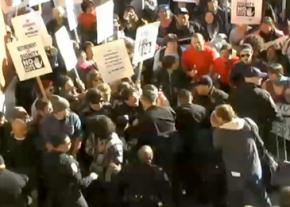UC tries to prosecute dissent
University of California (UC) administrators in conjunction with police and other agencies are carrying out a disgraceful campaign of trying to silence free speech--and prosecuting anyone who disagrees with their decisions.
Two student activists will appear in court on February 22 on alarmingly serious charges--including one for a felony charge of assaulting a peace officer--stemming from a protest against a UC Board of Regents meeting held at UC San Francisco on November 17.
At the demonstration, called to protest fee hikes and other issues, University of California Police Department (UCPD) officer Jared Kemper pulled a loaded gun on unarmed demonstrators. To cover up this gross violation of civil rights, one student was charged with beating Kemper, even though television footage clearly shows that no such thing occurred.
Despite the lack of evidence, these outrageous charges have been allowed to stand. The UC administration is adding pressure on activists with various alleged violations of the student code of conduct, including an absurd allegation of "destruction" of university property related to a chalking at UC Berkeley on November 19 to get the word out about the arrests two days earlier.
Eric-Michael Wilson is a UC Berkeley freshman facing false misdemeanor charges of riot and assaulting a peace officer, as well as code of conduct violations with the university. He talked to and about how the movement can respond on the issue of police repression on campus.
WHAT HAPPENED when you showed up December 14 with a group of students as a result of getting a citation at the UC Regent's protest?
AS WE were checking in with court officers, I noticed that several students who were ahead of me went in and came right out. I went in and never came out. I was arrested on felony and misdemeanor charges that I wasn't aware of. The warrant had been issued on December 10, and I wasn't notified in any way.
I was handcuffed by two officers and walked out to the sheriff's office. I had all my possessions removed, was searched and was placed in a holding cell for over an hour. After that, I was moved to another cell and allowed to make a phone call. One of the lawyers there that day in support of the protesters came back to speak with me. She contacted my grandmother, and we were allowed 15 minutes to talk about what was happening.
I was then escorted into an interrogation room and--without a lawyer present--questioned by UC police officers. They threatened me repeatedly by saying I needed to "own up to what I did if I valued my education." I refused to admit to anything, because at this point, I wasn't even sure of what I was charged with and kept repeating that I didn't do anything wrong. I told them only what had happened, and what I had previously told the officers at the scene on November 17.

On November 17, I had been interviewed by an officer who initially asked me if I had ever been arrested, if I had ever hit a cop, and if I had ever thought about hitting a cop. The recorder used during that interview was turned off for those questions, so I have no official record of that part of conversation. They also lied to me and told me other students had already told them I was responsible for the violence.
On the afternoon of the December 14 interrogation, the police eventually left, but not without giving me a business card and asking me to contact them later when I was ready to cooperate. My grandmother and other friends had to post $1,000 bond to get me out of jail that night at 10 p.m., and I had to appear in court again the next morning at 9 a.m. I also had my fingerprints and DNA taken between 7 p.m.
I learned when I got home that my dorm room had been searched by the UC police in my absence. My roommate was pushed out of the doorway when they showed up, and when asked if they had a warrant, they said they did but never produced one.
WHAT HAPPENED the next morning in court?
THE JUDGE looked at the charges and wasn't buying it. He reduced the charges to only misdemeanors despite the vehement protests of the district attorney who said on behalf of the people of California that I had "brought great dishonor upon the University of California Berkeley." I'm a mentor for a seventh grader in a local middle school, vice president of philanthropy in my dorm unit and spend my time organizing poetry slams and social justice campaigns. Are these the things that are dishonorable?
WHERE DO things stand for you now?
I GO back to court on February 22 after the state granted the district attorney a continuance to try to put together a stronger case with their flimsy evidence. My grandparents continue to have to make payments on the remaining $2,000 bail that is owed on their limited income. I'm facing conduct charges as well from the university.
I would say that my only crime has been to use my right to free speech and stand up for the rights of everyone to get an education. I was singled out for no reason other than the fact I was in the front and a young Black man in the crowd. What has been on my mind from the beginning of this whole ordeal is that people need to be aware that the University of California Police Department, the university and courts have the power to target people, fabricate evidence and push whatever agenda they want regardless of the truth.
We need to take this seriously and defend our movement against these attacks. We need to stand together because if we don't I am just a single Black man standing against the cops.


